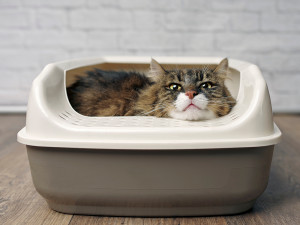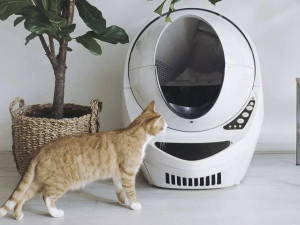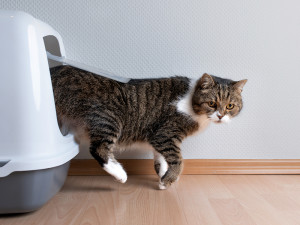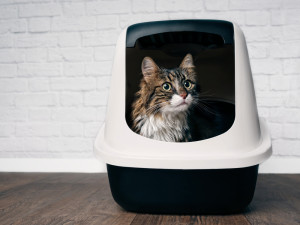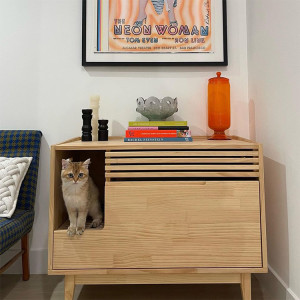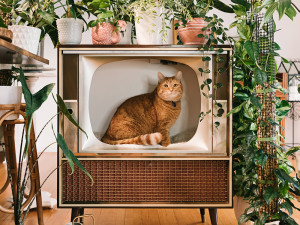Can Cats Share a Litter Box?
The better question is should they?
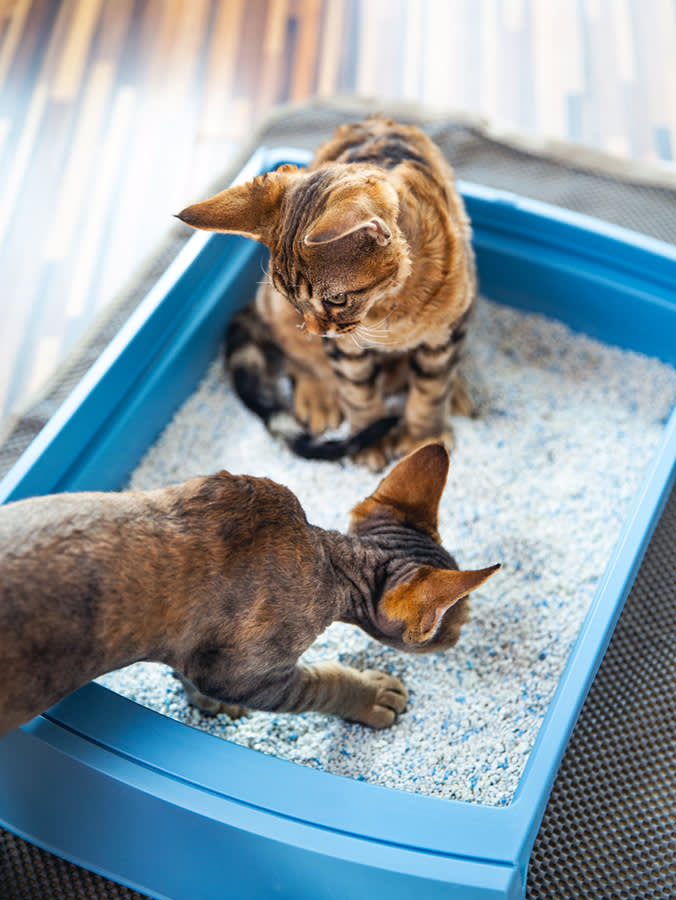
share article
In this Article:
Can Multiple Cats Share a Litter Box? Should Cats Share a Litter Box? How Many Litter Boxes Do I Need for My Multi-Cat Household?opens in a new tab Reasons to Have Separate Litter Boxes for Your Catsopens in a new tab Potential Risks of Sharing a Litter Boxopens in a new tab Strategies for Successful Litter Box Sharing opens in a new tab
Of course, cats can share a litter box, but due to their territorial nature, it’s not recommended. Sharing can cause stress and conflicts. Ideally, experts say you should have one litter box per cat, plus one extra, to ensure comfort and reduce issues like peeing and pooping outside the box.
But despite this conventional wisdom about having more than one litter box in a multi-cat household, it’s just not feasible in every case. As a devoted parent to three cats (yes, three), all of us living in a one-bedroom New York City apartment, I don’t want my cats to be unhappy — but I’ve only got a certain amount of space to work with. I don’t want my apartment to become a maze with litter boxes around every corner.
So, do you really need multiple litter boxes for two cats — or more? I asked two cat experts what they think. Here’s what they said, plus answers to some commonly asked questions about cats and litter box behavioropens in a new tab.
Can multiple cats share a litter box?
Do cats need multiple litter boxes? Dr. Kelly Diehl, who’s been a veterinarian for 35 years and a cat parent for 55, Senior Director Of Science Communication at Morris Animal Foundationopens in a new tab, says that while it’s possible for cats to share, it’s not preferable. “They can share, but many veterinarians and cat behaviorists suggest having one more litter box than you have cats. For example, if you have two cats, you should have three litter boxes.”
Cat behaviorist Stephen Quandtopens in a new tab calls this “the N plus one rule, where N is the number of cats,” and agrees that cats shouldn’t have to share. “ If you start skimping on the number of litter boxes, you risk causing one or more of your cats to start eliminating outside the box.” While this has never happened to me personally, that might just be the luck of the draw: My cats don’t have health problems (knock wood), and while they delight in knocking over lamps and head-butting me so hardopens in a new tab it sometimes leaves a bruise, they’re pretty good about bathroom stuff. They do occasionally fail to cover up their businessopens in a new tab when they’re finished in the litter box.
But back to the need to provide more than one litter box for your multiple-cat household: In even more bummer news for cat parents living in cozy quarters, Diehl says the litter boxes shouldn’t be close to each other. “They should be scattered on different levels of the house, or at least away from each other. Don’t have two sitting side by side,” she says.
It’s not all bad news, however. Even if it’s not recommended, sharing a litter box does have some upsides — as well as drawbacks. Keep reading to find out what they are, plus answers to a couple of other commonly asked questions.
What are the pros of sharing a litter box?
Are there any upsides to cats sharing litter boxes? I asked Diehl and Quandt if they could come up with any — even though their official recommendation is to provide more than one litter box for more than one cat.
It’s easier for cat parents. “The obvious pro is that it’s much easier for people to not have to separate their cats,” Diehl says. This brings up another question that’s always popped into my head when I consider trying to fit more than one litter box in my apartment: How do you keep your cats out of each other’s litter boxes? (We’ll address that issue later in the story, but the short answer is you can’t.)
You’ll have fewer litter boxes to clean. I’m fortunate enough to own an automatic litter boxopens in a new tab — basically, a self-cleaning litter box for multiple cats — and I love it. Truly, it’s a sanity-saver for me. Still, I have to empty out the litter drawer of the automatic litter box and change the lining regularly. I also need to scrub the whole thing down once in a while (a process that would be much easier if I had a backyard and a hose). Only having to do this for one litter box is a pro in my book, anyway.
What are the cons of sharing a litter box?
Diehl points out that monitoring your cats’ health can be trickier when they share a litter box, while Quandt reiterates that sharing can lead to messes no one wants to deal with.
You may not be able to tell if one of your cats is having a medical issue. “The cons can be if one cat is having stooling issues, or urination issues. It can be hard to sort out the affected cat if they share a box,” Diehl says.
Cats can transmit diseases to each other when they share a litter box. Cat feces may contain parasites and bacteria — and those will also be shared when they share a litter box.
Your cats may start going outside the box. “We don’t want competition for resources, as that can lead to conflict,” Quandt says. “Cats have preferences, and choice gives agency. If you give a cat choices for where to go, they will absolutely exercise those choices. Inside the boxes is a much better choice than outside!”
Can bonded cats share a litter box?
Bonded cats love to cuddle up, tussle, play, and sleep together — but that doesn’t mean they want to share a bathroom. The N plus one rule stands, even for bonded siblings (like my two littler guys, Winston and Wilbur).
Can a male and female cat share a litter box?
When it comes to cats, all bathrooms are gender-neutral; male and female cats don’t need to use separate litter boxes. But again, if you’ve got more than one cat, it’s best practice to have more than one litter box.
Should cats share a litter box?
The answer seems to be pretty clear, but I asked Quandt one more time whether it’s OK for cats to share a litter box. “The rule of thumb is there should be one box for each cat plus one,” Quandt says. “So no, multiple cats shouldn’t have to share one box.”
If you don’t think you have space (like I didn’t), check out some options for litter box enclosuresopens in a new tab that stylishly disguise what’s really going on inside them. Incorporating litter boxes into your decor might even turn into a style upgrade for your space. Plus, your cats will thank you. (Possibly by dragging their cat toys into your bed — my favorite thing that my cats do to say “I love you.”)
How many litter boxes do I need for my multi cat household?
Remember that N plus one rule Quandt shared above? All the research I found backs it up. Experts say you need one more litter box than you have cats. (For those keeping score, that means I should have four litter boxes in my one-bedroom apartment with three cats. Four. So, the key phrase I should really be researching is “How to hide multiple cat litter boxes.”) Ready to start shopping? Here’s a good place to start.opens in a new tab
Reasons to have separate litter boxes for your cats
Do you need multiple litter boxes for two cats? In a word, yes. In case it’s not yet clear from the above, the experts strongly recommend having separate litter boxes for multiple cats. Here’s why:
It reduces the chances of cats going outside the boxopens in a new tab.
It helps keep cats from fighting.
It gives cats choices about where to go.
You can keep a better eye on your cats’ health.
Multiple cats can transmit worms through a shared litter box.
Potential risks of sharing a litter box
Sharing a litter box among more than one cat isn’t just one of those things people recommend for no real reason. In fact, having too many cats for your number of litter boxes can be hazardous to your cat’s health —as well as potentially making for a mess when they start peeing and pooping outside the box. (Since researching this story, I’ve gotten another litter box for my babies: this beauty from Tuft + Pawopens in a new tab.)
Territorial behavior
Experts say it’s crucial to consider a cat’s individual preferences and dynamics. While some cats may be comfortable sharing, others may get territorial and prefer separate boxes. Providing multiple litter boxes in different locations around your home can help prevent conflicts and offer each cat their own space.
Reluctance to use a soiled or occupied litter box
Cats really prefer their litter boxes to be tidy. Quandt says that a dirty litter box is the number-one reason cats pee and poop outside the box. And the more cats you have using the box, the faster it’s going to get gross.
Health concerns
As stated above, it’s possible for your kitties to infect each other with parasites and bacteria when they share a litter box. And while having more than one litter box doesn't guarantee your cats won't ever use the same box (they likely will), it’s one more reason to provide plenty of places to go.
Difficulty monitoring individual cat’s litter box habits
Again, it’s difficult to keep cats from using each other’s litter boxes, even if you’ve got that magic N plus one number of litter boxes at home. But having multiple boxes may make it easier to see whether something is going on with someone's digestive system. When you know that one of your kitties prefers a certain box, you'll have a better idea of their particular litter box habits — which can provide a window into their overall health.
Strategies for successful litter box sharing
Even if you’ve got plenty of space, you may be reluctant to provide more than one litter box for your cats. Having multiple boxes means buying more kitty litteropens in a new tab, for one thing, and that’s an added cost. It also means checking, scooping and cleaning more than one litter box regularly. Plus, even the best litter box doesn’t smell great, and it’s tempting to cut down on the number of stinky spots in your home. Here are a few strategies for making multiple litter boxes work in your home.
Ample space and multiple exit points
Make sure that each litter box has enough space around it that your cats will feel comfortable using any of them. Your kitty crew should be able to get in and out of the boxes from more than one place. You never want your cats to feel crowded or trapped when they’re using the litter box.
Consistent cleaning routine
Whether you do all of them at the same time or you space out the chores, make sure you’re scooping and cleaning each litter box on a regular basis. That means scooping at least once a day, and fully cleaning monthly. Here's howopens in a new tab.
Pheromone sprays or diffusers
Some people swear by pheromone sprays, like Feliwayopens in a new tab, for easing a cat’s anxiety. If your cats are going outside the box or otherwise having trouble getting with the litter box program, it’s worth a try — provided you've already checked with your vet to make sure there's not an underlying health problem. Here are some to tryopens in a new tab.
Separate feeding, watering, and resting areas
Again, you need to have the luxury of space to do this, but ideally your cats will have their own spots to eat, drink water, and rest. A cat bed for each of your little loves is essential, as well as separate feeding mats with food and water dishes.
FAQs (People also ask):
Should I prevent my cats from sharing a litter box?
The real question here is: Can you prevent your cats from sharing a litter box? And again, the answer is unequivocal. “No. Cats will use whatever is available to them when they want to use them,” Quandt says.
And here’s a reminder that whether you have one cat or five, teaching them to use a litter box properly is a good idea. This involves introducing your cat to the litter box, figuing out which type of litter they prefer, and encouraging cats to use the litter box consistently.
Can two cats share an automatic litter box?
A self-cleaning litter box for multiple cats is a real time-saver, because you don’t have to scoop multiple boxes. But the rule stands: Two cats should not have to share a litter box, whether it is an automatic litter box or an old-school scoop-it-yourself style version. Even the best self-cleaning litter boxopens in a new tab for multiple cats is a no-go, experts say.
What should you do when your cat won’t use the litter box?
If your cat refuses to do their businessopens in a new tab in the litter box, first make sure it’s clean, and that it's in a quiet, private location (as much as possible). Try different types of litter to see whether that makes a difference, and try a larger box, as some cats need more space than others. If none of that works, it's time for a trip to the vet.
I moved, and now my cat won’t use the litter box. What can I do?
Sometimes it takes a while for cats to get used to a new environment. Make sure the litter box is clean, and that it’s in a nice quiet spot where your cat can have some privacy. You may need to think of it as if you're training your cat to use the litter boxopens in a new tab all over again — but it shouldn’t take long. Here’s how to do it.opens in a new tab

Elizabeth Laura Nelson
Elizabeth Laura Nelson is a writer and editor based in Brooklyn, New York. As a child, Elizabeth was scared of cats (claws and teeth, yikes) but she has since gotten over her fear and now shares her home with three sweet and gentle feline companions who make life better (and cuddlier) every day.
Related articles
![a cat peeks out of a litter box lid]() opens in a new tab
opens in a new tab5 Litter Boxes Your Cat Likely Won’t Reject
Think like a cat when choosing a litter box...so you can go back to not thinking about litter boxes.
![Woman holding her black and white cat.]() opens in a new tab
opens in a new tabThe Ultimate Shopping List for Your New Cat
It’s National Kitten Day! Here are all the new cat essentials you need, recommended by real pet parents.
![Small orange cat in wooden litter box.]() opens in a new tab
opens in a new tab9 Litter Box Enclosures That Aren’t Total Eyesores
Keep your cat’s litter box out of sight — but easy to scoop.
![Cat sitting in a teal litter box]() opens in a new tab
opens in a new tabHow to Train a Cat to Use a Litter Box
If you do nothing else, teach your cat to poop in their litter box (not your shoe).
![cat in a follow tv]() opens in a new tab
opens in a new tab16 Pieces of Furniture So Stylish You Would Never Know They’re for Cats
Mid-century modern coffee table or litter box? Industrial bookcase or cat tower? If you can’t tell, that’s kind of the point.
![Large orange cat wearing a diaper.]() opens in a new tab
opens in a new tabThe Best Diaper Options for Kittens in 2024
Plus, all your kitten-diaper questions answered (we know you have them).
